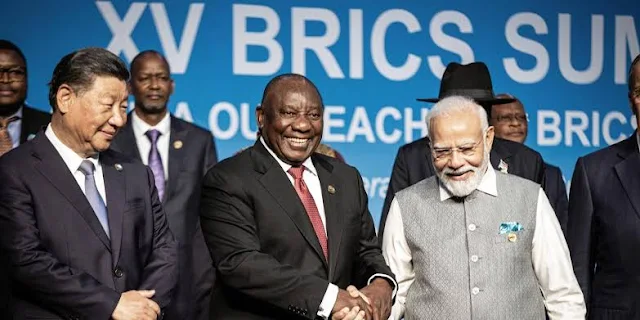How BRICS+ can act as a shelter, a place of refuge for those battered by the storm of today’s economic bullying
The post-Cold War order is unravelling. The global trading system and the multilateral order, painstakingly built after the Second World War, have been torn apart. What once stood as a framework for cooperation is now a weapon of mass bullying. Trade wars strike like sudden cyclones. Tariffs rise unpredictably. One day they are 15 percent, then they shoot to 50 percent, jump to 100 percent the following week and drop again to 20 percent days later. Such turbulence shakes small and large economies alike, bringing uncertainty, disrupting supply chains and sending countries scrambling for new markets and solutions.
This new age of upheaval calls for BRICS+, a dynamic group of countries that believe in multipolarity. BRICS+ must rise not just as an economic grouping but as an empowering and stabilising structure for the Global South. BRICS+, is a brick-solid, enduring and purpose-driven framework.. Moreover, BRICS+ has to be empowering. Like any well-built structure, it must be firm enough to contain the landslide of confusion yet adaptable enough to let water pass through, allowing flexibility without compromising strength.
But it is not enough for BRICS+ to simply hold the line. It must also pave the road forward. Over 45 percent of the global population lives in BRICS+ countries, mostly in the Global South where life remains precarious and economic security is far from guaranteed. Strong bricks must be laid to create roads that lead towards resilience, inclusive growth and shared prosperity.
To achieve this, BRICS+ must deliver real and tangible results. People need to feel the benefits of cooperation. They need jobs, stable markets, corridors of trade and access to opportunities. The New Development Bank (otherwise known as the BRICS Bank) was a strong start. It is making a difference across Asia, Africa and South America, as a strong alternative to the traditional multilateral and private funding systems that have often proven difficult for developing countries to access on equitable terms. It is time now to build more permanent BRICS+ institutions that implement summit resolutions.
These outcomes must not gather dust, rather they must be carried out consistently and transparently. For this, we need permanent institutions that support policy coordination and implementation across member states, institutions that increase education and training exchanges between countries, institutions that manage trade, and that quickly respond to natural disasters. These are the institutions that should actively manage contradictions between BRICS+ members, taking mandates from heads of states.
To achieve this key goal, BRICS+, primarily needs a permanent secretariat. Without it, BRICS+ risks appearing as a provisional or noncommittal mechanism. Crudely stated, without a permanent secretariat, the grouping resembles a structure built without cement to bind all its bricks together.
For BRICS+ to increase trade among its members, it must mobilise all productive forces. It must ramp up manufacturing output and focus on producing more value-added goods. Only then will countries have something meaningful to offer each other beyond raw materials. Trade among friends must be more than substantial, it has to be mutually enabling.
Thus, the primary task for BRICS+ is to become an enabler of builders. No country can modernise without its leaders, development-oriented elites, stakeholders willing to make sacrifices and citizens yearning for a better life. But they can certainly use a little bit of outside help. Indeed, developing countries can utilise outside assistance more effectively if it can empower and enable their efforts.
In our globalised world, many developing countries still need outside assistance to weather the storms. As such, BRICS+ can also act as a shelter, a place of refuge for those battered by the storm of today’s economic bullying. The volatility we are witnessing is not new, it is just a variant of what the Global North has long imposed upon the Global South. The difference now is that it is more erratic and bombastic, equally traumatic if you listen to the rhetoric about the Middle East and recent warnings to countries like Namibia where economic pathways are being dictated by external parties.
Let us restate what many ignore when analyzing what sustained BRICS beyond a decade and a half. The leaders are more focused on what unites them than on sources of divisions. There is mutual respect and interest to build a multipolar world. Contradictions are not being buried but actively managed by the leaders. That is a marker of strength, a signal to the Global South that the bond of solidarity can take nations forward.
The task before BRICS+ is daunting, yet necessary. The Global South cannot afford to be sidelined any longer. It is time to lay firm, interconnected and enduring bricks that will advance development, shelter, security and shared prosperity for the people of the Global South.
---
Busani Ngcaweni is Adjunct Professor at Wits School of Governance, South Africa, and Shiping Tang is Professor at Fudan University’s School of International Relations Public Affairs. This article was produced by Globetrotter


Comments